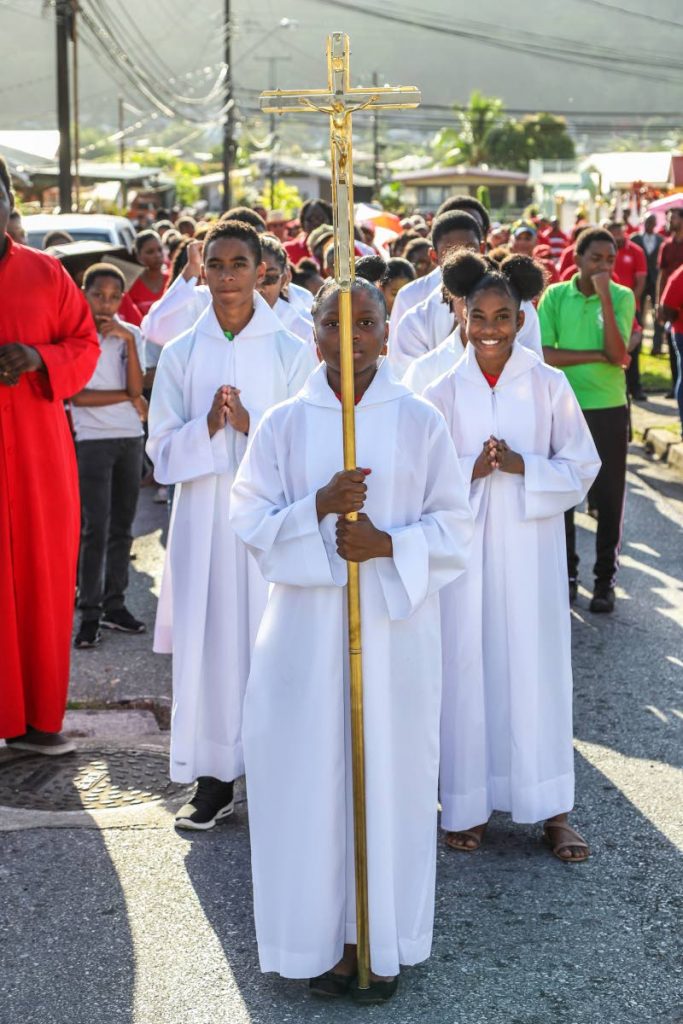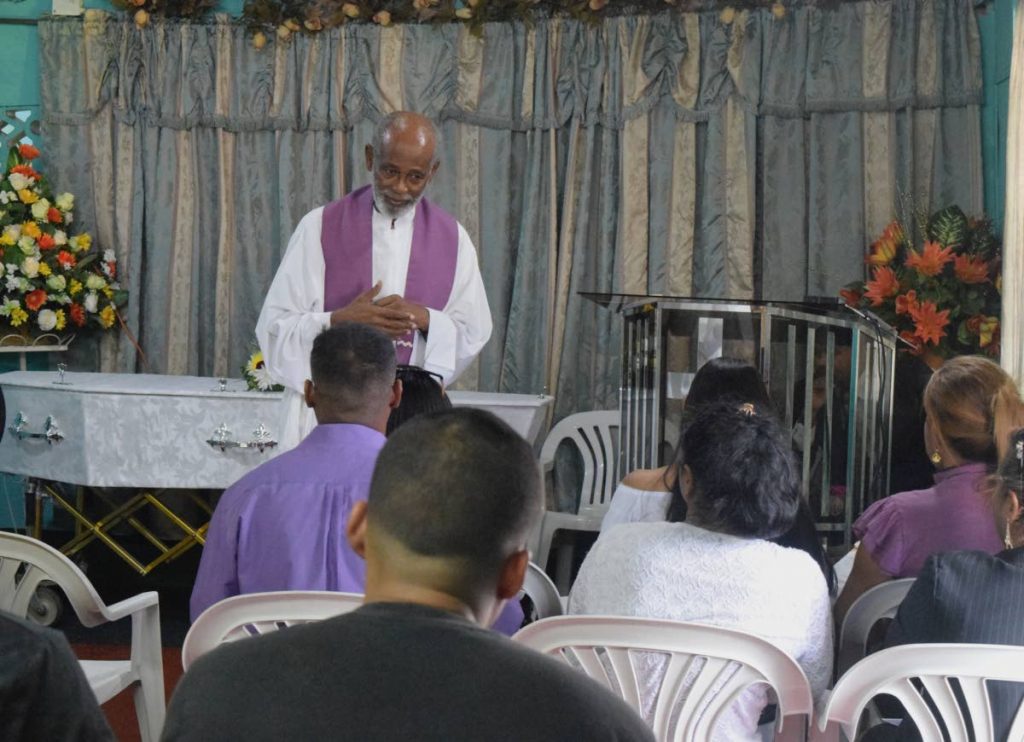Gloria a Dios

For years, Christian denominations have ministered to the spiritual needs of the Spanish-speaking community in TT through either Spanish or bilingual services.
As hundreds of Venezuelans flee their homeland because of the current political and economic crisis however, they are expanding their services.
Pastor Cordelle Williams, of the Cocoyea and St John’s Seventh Day Adventist (SDA) churches, told Sunday Newsday that six years ago, Cocoyea SDA church conducted a bilingual service for mostly Cuban parishioners every second Saturday of the month. The pastor at the time invited Cuban doctors and nurses who worked at the hospitals. However, many of them returned home and the services stopped. Instead, a translator assisted the few who remained through the service.
Williams is fluent in English, Spanish and French and pastored in several Caribbean islands where he worked with the Spanish community for over 13 years as part of his ministry. “When I got there four years ago there were not many Venezuelans and Cubans so my job was to continue to work with them outside until we had enough persons to have a service. With the influx now of Venezuelans it’s more permanent.”
However, two years ago he decided to have a Spanish service at the Cocoyea SDA church every Saturday at 9.30 am to noon. “There are many who are coming who have asked for a Spanish service. I believe many folks who are here are seeking the Lord in terms of trying to find hope, trying to find peace, trying to find a means of solace. I think the church is able to provide that, not only spiritually but holistically.”
His churches arranged social activities including sports days, concerts, banquets, and both English and Spanish classes at St John’s Community Centre, San Fernando; Morne Diablo, Penal; and Monroe Road, Cunupia.
They also assist in practical ways, working with NGOs to carry immigrants from Cunupia to Penal and San Fernando to Chaguanas to Immigration, to get medical assistance, clothing, food and other necessities.
“The idea is not only to bring them to church but to involve them in society as well. There are many folks who want to build bus sheds, feed vagrants, willing to cut the vagrants’ hair because they are barbers, they are willing to clean the beaches, and so forth. They are ready and willing to get involved in community service once they get the opportunity. So they don’t just want to get food and the other things we offer but they want to get back into society and to be involved and that is very commendable.”
Williams said his Spanish service had an attendance of 20 to 40 people made up of mostly Cubans and Venezuelans. He said many others wanted to attend but the cost of transportation was a problem. He said they, especially the Venezuelans, had limited resources and asked that any NGOs willing to help by donating a bus contact him. In the meantime, the church was hoping to arrange to have Spanish services at various SDA churches on Sundays.
He also noted that the University of the Southern Caribbean had SDA services in Spanish every other Saturday catering mostly to students with Spanish as their first language. He also hosted a bilingual radio programme on Sky 99.5FM every third Saturday of the month called Beyond Boarders or Más Allá De Las Fronteras.

The Pentecostal church, Faith Assembly International in Arouca, was also doing what it could to minister to the Spanish-speaking community in TT with a bilingual ministry called Luz De Salvacion (Light of Salvation). Conducted by Pastors Arnaldo Garcia and Kevin Garcia, the service provided simultaneous translation to an average of 200 congregation members every Sunday from 1 pm to 3 pm. Pastor Arnaldo explained that it all began in 2010 when three Colombian men began attending the Sunday service. One day one of the men approached him and asked if he spoke Spanish and if he could translate the service for them. He did so but disturbed the people nearby. The pastor at the time, Faith Assembly’s co-founder, Pastor KK Bachew, allowed him to take them to one side of the church. Two Sundays later there were 20 people. He had to shout and strained his voice so they gave the attendees headsets through which they could hear his translation. “Pastor KK said he had a vision to open a bilingual service to have a place for Spanish-speaking people to come. So in 2011 we opened our first bi-lingual service. We started very small in the chapel next to the main church with Pastor Wesley Poorai and myself.” They stayed in the chapel for two years and the Spanish-speaking congregation continued to grow until it could not be contained in the small chapel.
When Pastor KK died in 2012, his son, Pastor Jason Bachew took over.
Eventually he directed Arnaldo and his new co-pastor, Kevin Garcia, to conduct the service, the third of the day, in the main building on Sundays. Since then, people from across the country, especially from east and west Trinidad took part in the service.
He said Faith Assembly intended to keep the service bilingual because it gave people the opportunity to learn another language. They also made both Spanish and English bibles available, and used subtitles when displaying lyrics to the music.
“We have right now in our congregation around 50 people from Trinidad besides Cubans, Colombians, some from the Dominican Republic, and the majority are Venezuelans. Some of them are students from UWI who use our service to practice... About 16 people from Trinidad and other Latin American countries work to make it happen. We are doing this because we love God and that’s it. It has been a blessing.”
He said they also distributed food hampers, clothes, helped them get jobs, and hopefully contribute to them living a good life in TT.
Born in Cuba, Arnaldo grew up in Venezuela and moved to TT in 2004. He said he has seen TT grow and change for good and for bad in many areas through the years – economically, culturally, how people dressed, drove, spoke to and treated each other. “Trinidadians used to be a very warm people but we have learned by force that not every immigrant who comes here is a good person or comes with good intentions... We are getting xenophobic against anything that sounds Spanish regardless of where they come from. Now we are trying to put everyone on the same box. Not necessarily because one or two are doing incorrect things means that all of them are doing the same thing. And that applies for any human being.”
His advice? “Trust in God and do what is right, be honest with everyone, and try to do what is best for the country... Be a vessel of blessings for other people instead of accumulating things for yourself unnecessarily. Lead a simple life and be a blessing.”
The Roman Catholic church in TT also made some steps in this area. In 2018, Archbishop Jason Gordon requested every parish establish a ministry for migrants and refugees. He asked people to volunteer for their “welcoming, protecting, promoting and integration.” The ministry was expected to provide food, clothing and shelter at any church.
When it came to spiritual services however, an official at the Archbishop House said the only regular Spanish mass on the Roman Catholic schedule was at the Fatima College Chapel every Sunday at 10 am. There was also a bilingual mass on the fourth Sunday of every month at 5 pm at the St Cecilia Chapel in La Seiva. The rest, she said, were sporadic.
The St Michael’s Parish secretary explained that for four years there was a Spanish mass once a month at 11 am. Although the attendance was around 25, they felt the need to serve all who were interested.
With the change in the parish priest last year, it was decided to incorporate the Spanish-speaking congregation with the English-speaking parishioners. Therefore, from August last year, one bilingual mass was conducted for all.

Even funerals are being conducted in Spanish. This was the case on May 14, when pastor Williams and Fr Glyn Jemmott, of St Theresa’s RC Church, offered words of comfort in Spanish to the family and friends of Venezuelan Katherine Diaz at a funeral home in Princes Town. Diaz was stabbed to death on May 5 and her Venezuelan husband Jose Goregorio Moya Guerra has been charged with her murder.


Comments
"Gloria a Dios"